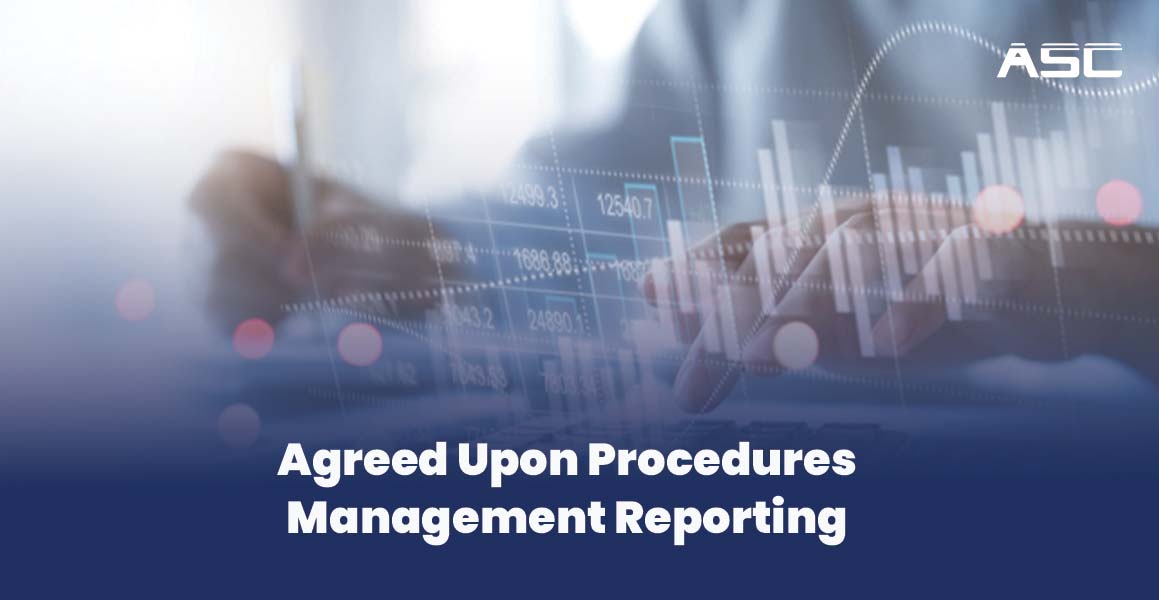Agreed Upon Procedures Management Reporting

Agreed Upon Procedures Management Reporting is a specialized service that involves conducting tailored procedures agreed between the auditor and the client, and subsequently reporting on the results of these procedures. This service is designed to provide targeted assurance, focusing on specific areas of interest such as compliance, internal controls, and financial reporting. It is widely used by organizations seeking independent, objective insights without the full scope of a traditional audit.
What Is Agreed Upon Procedures Management Reporting?
Agreed Upon Procedures (AUP) Management Reporting refers to the process where an independent auditor performs specific procedures that have been mutually agreed upon by the client and the auditor. Unlike a full audit, an agreed upon procedures audit focuses only on particular aspects of an organization’s operations. The result is an agreed upon procedures report that details the findings and the extent to which the agreed procedures were performed. This report is often accompanied by an agreed upon procedures checklist to ensure all specified procedures are covered.
Key Areas of Agreed Upon Procedures
Agreed Upon Procedures Management Reporting typically covers:
- Compliance Verification: Assessing adherence to regulatory and internal standards.
- Financial Reporting: Reviewing specific areas of the financial statements to ensure accuracy.
- Risk Assessment: Evaluating the effectiveness of internal controls and risk management practices.
- Operational Efficiency: Examining processes to identify potential inefficiencies or areas for improvement.
- Quality Assurance: Providing assurance on the consistency and reliability of operational procedures.
Benefits of Agreed Upon Procedures Management Reporting
The benefits of engaging in agreed upon procedures services include:
- Targeted Assurance: Focuses on specific areas of interest, offering detailed insights without the scope of a full audit.
- Flexibility: Procedures are tailored to the client’s requirements, ensuring relevance and precision.
- Transparency: The agreed upon procedures audit report provides a clear, objective account of the procedures performed and the findings.
- Cost Efficiency: Less extensive than a full audit, making it a more cost-effective solution for addressing specific concerns.
- Risk Mitigation: Identifies potential issues early, enabling proactive measures to mitigate risks.
- Stakeholder Confidence: Enhances trust among investors, regulators, and management by validating key operational aspects.
Industries Covered Under Agreed Upon Procedures Management Reporting
Agreed Upon Procedures Management Reporting is applicable across a variety of industries, including:
- Financial Services: Ensuring regulatory compliance and the integrity of financial reporting.
- Manufacturing: Verifying production controls, quality assurance, and supply chain management.
- Information Technology: Assessing IT controls, cybersecurity measures, and data integrity.
- Healthcare: Reviewing compliance with industry standards and internal controls in patient care operations.
- Retail and E-Commerce: Ensuring accurate reporting and robust internal controls in sales and inventory management.
- Automotive: Validating operational processes and supply chain management to support quality standards.
How Does Agreed Upon Procedures Management Reporting Work?
The process typically involves several key steps:
- Engagement: The client and auditor agree on the specific procedures to be performed. This agreed upon procedures engagement is documented in an engagement letter.
- Planning and Scope Definition: Define the scope and objectives, including the areas to be examined. An agreed upon procedures checklist is often used to ensure all aspects are covered.
- Procedure Execution: The auditor performs the agreed upon procedures audit, collecting evidence and data as specified.
- Reporting: The findings are compiled into a report on agreed upon procedures. The report on agreed upon procedures details the procedures performed and the results obtained, without providing an overall opinion on the entity’s financial statements.
- Review and Follow-Up: The report is reviewed by the client, and any necessary follow-up actions or further procedures are planned.
What Documents Are Required for Agreed Upon Procedures?
Typically, organizations need to provide:
- Documentation outlining the agreed procedures, including the agreed upon procedures checklist.
- Relevant internal control policies and process documents.
- Financial records and operational data related to the scope of the procedures.
- Correspondence and previous audit reports, if available.
- Any additional documents that support the specific areas being reviewed.
Fee Structure
The fee structure for agreed upon procedures services generally includes:
- Engagement Fees: Charges for initial consultation and engagement planning.
- Audit and Reporting Fees: Costs associated with executing the agreed upon procedures and preparing the audit report.
- Documentation and Processing Fees: Expenses for compiling and reviewing necessary documents.
- Ongoing Support Fees: Periodic charges for any follow-up procedures or additional reporting requirements.
- Optional Consultancy Fees: Additional charges if specialized expertise is required for complex procedures.
Fees vary based on the complexity and scope of the procedures, the industry, and the level of detailed analysis required.
Challenges and Solutions for Best Compliance Practices
Common challenges in executing agreed upon procedures include:
- Defining Clear Scope: Establishing precise, mutually agreed procedures can be challenging.
- Extensive Documentation: Gathering and verifying all required documentation demands significant effort.
- Data Integration: Consolidating data from multiple sources to ensure comprehensive coverage.
- Timeliness: Managing the process within a set timeframe while maintaining accuracy.
Effective solutions include:
- Conducting thorough pre-engagement meetings to clearly define the scope and expectations.
- Utilizing digital tools for efficient data collection and integration.
- Establishing dedicated teams to manage the documentation process.
- Implementing robust project management practices to ensure timely completion of procedures.
- Regular training and updates on best practices in agreed upon procedures audit.
How ASC Group Can Help
At ASC Group, we specialize in delivering comprehensive Assurance Services, including Agreed Upon Procedures Management Reporting. Our experienced team of assurance advisors and auditors works closely with your organization to design tailored procedures, compile accurate documentation, and deliver clear, actionable reports.
We provide expert guidance through every step of the agreed upon procedures engagement, ensuring that your business benefits from transparent, targeted assurance without unnecessary complexity.
Contact ASC Group today for professional, non-promotional support in achieving robust agreed upon procedures audit, and gain the insights needed to strengthen your internal controls and compliance practices.
